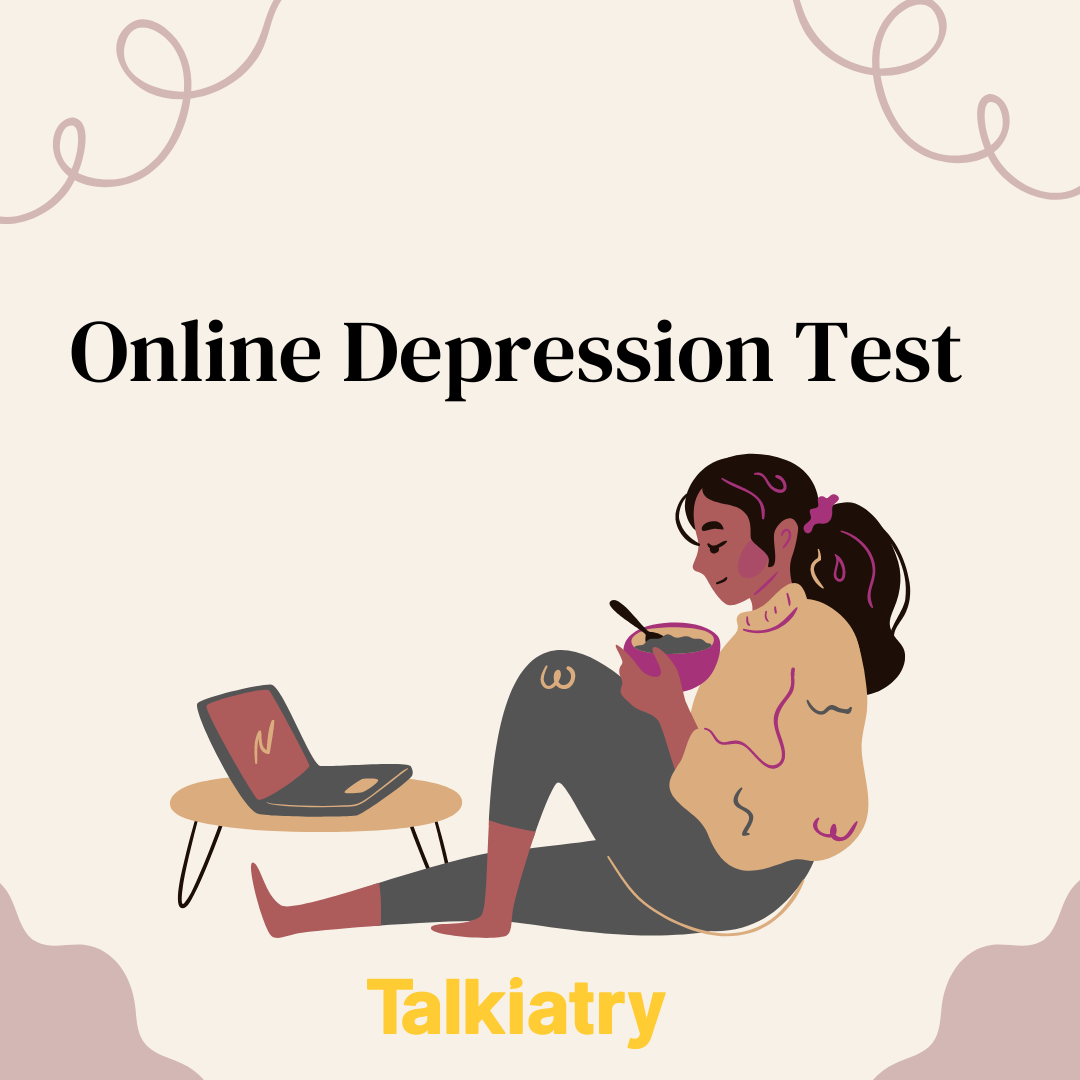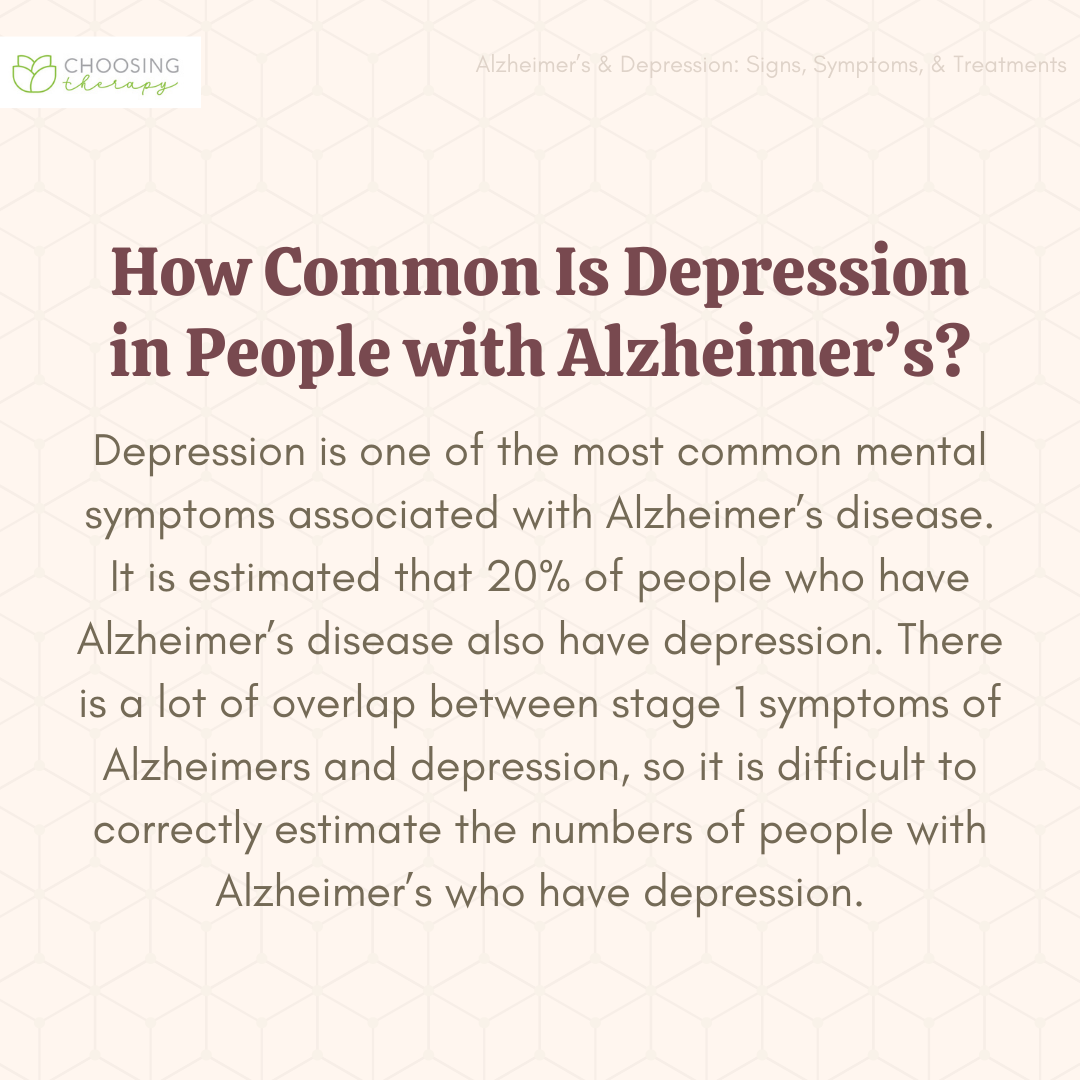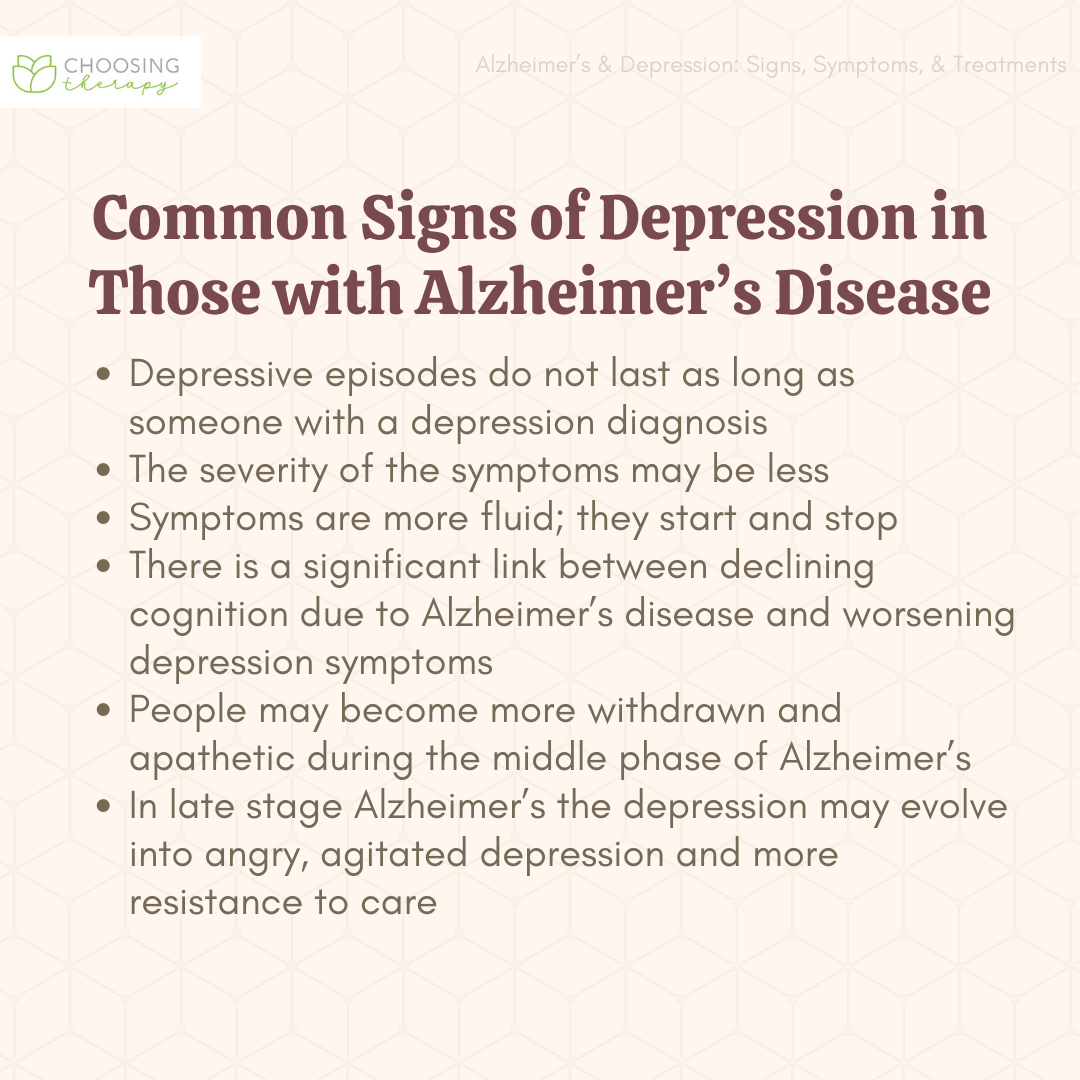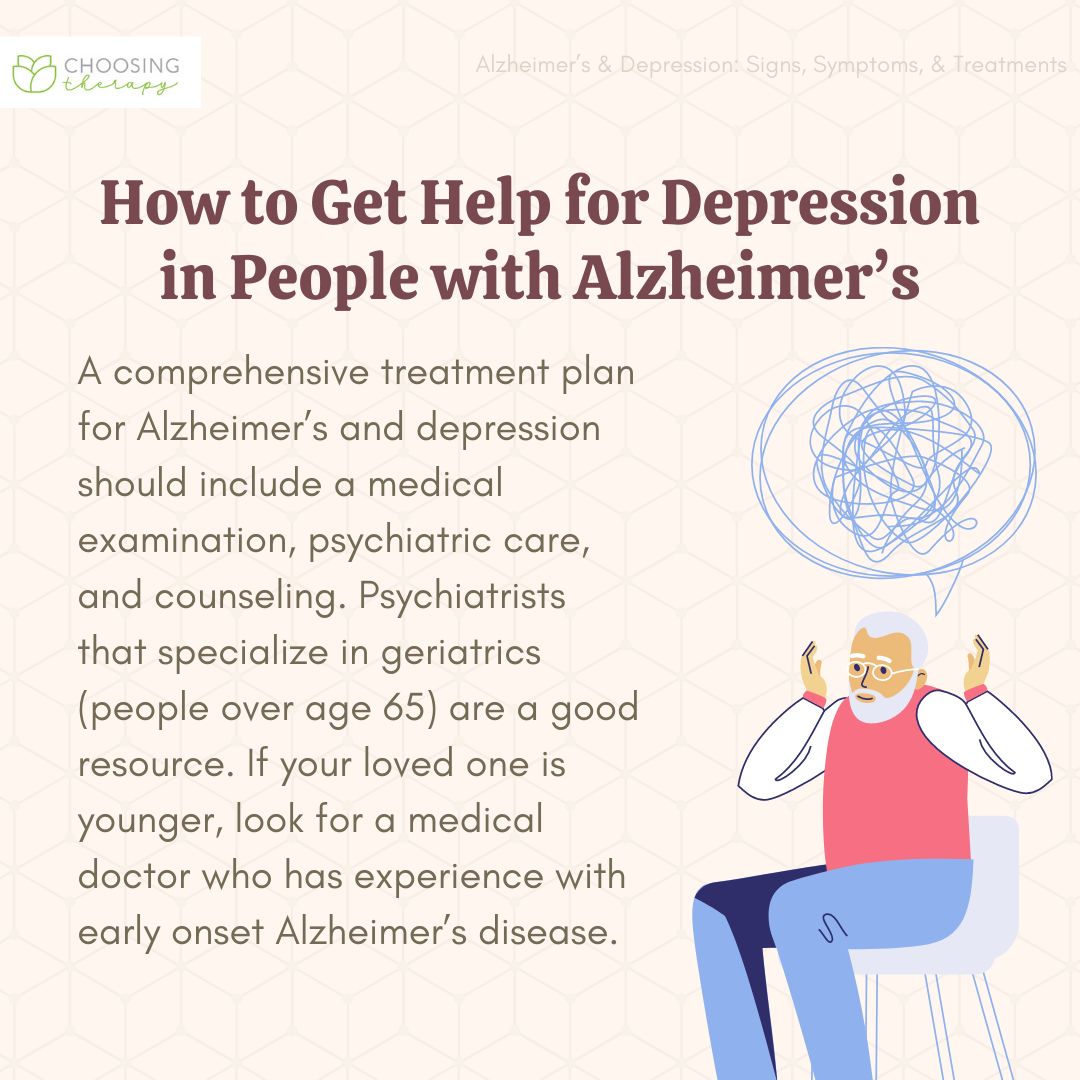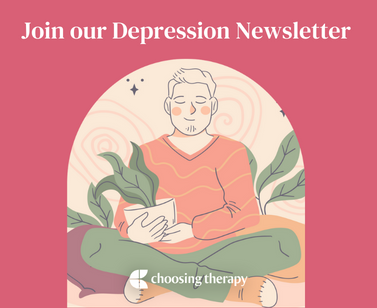Depression and irritability are frequent symptoms of Alzheimer’s. Alzheimer’s Disease is a progressive illness with multiple stages. Proteins called amyloid and tau surround and entangle brain cells, damaging and altering brain function. The primary symptoms are loss of memory and organizational skills. Severity and duration of symptoms varies, and it can result in altered personality, behavior, and mood.
Depression Is Treatable With Therapy
Would you like to feel more happiness and joy? BetterHelp has over 20,000 licensed therapists who provide convenient and affordable online therapy. BetterHelp starts at $65 per week. Take a Free Online Assessment and get matched with the right therapist for you.
How Common Is Depression in People With Alzheimer’s?
Depression is one of the most common mental symptoms associated with Alzheimer’s disease. It is estimated that 20% of people who have Alzheimer’s disease also have depression.1 There is a lot of overlap between stage 1 symptoms of Alzheimers and depression, so it is difficult to correctly estimate the numbers of people with Alzheimer’s who have depression.
Who Gets Alzhiemer’s Disease?
There are gender differences regarding who gets Alzheimer’s disease:
- Almost two thirds of Americans with Alzheimers are women. Women live longer and depression is a common symptom for older adults2
- Multiple studies have found that women with Alzheimer’s Disease are more likely to have depressive symptoms3
Common Signs of Depression in Those With Alzheimer’s Disease
Symptoms discovered in people with Alzheimer’s disease often mirror depression symptoms, though the severity may be less. One of the most devastating aspects of Alzheimer’s disease is how it impacts thinking, problem solving, and the ability to use words. Patients may not be able to explain their feelings. Alzheimer’s disease impairs the ability to be introspective. This can be frustrating for the person with Alzheimer’s and increase their isolation and depression. It offers challenges for loved ones and caregivers, too—they may not recognize the depression as readily.
People with Alzheimer’s Disease experience depression in different ways than those with the sole diagnosis of depression. Because Alzheimer’s patients cannot always report their symptoms, they must be diagnosed based on observations of those who spend time with them.
Here are notable differences between the diagnosis of depression and depression as a symptom of Alzheimer’s disease:
- People with Alzheimer’s are generally not suicidal
- Their depressive episodes do not last as long as someone with a depression diagnosis
- The severity of the symptoms may be less
- Symptoms are more fluid; they start and stop
- There is a significant link between declining cognition due to Alzheimer’s disease and worsening depression symptoms4
- People may become more withdrawn and apathetic during the middle phase of Alzheimer’s
- In late stage Alzheimer’s the depression may evolve into angry, agitated depression and more resistance to care
Diagnosing Depression With Alzheimer’s Disease
The diagnosis of depression in someone with Alzheimer’s disease can be difficult. The patient may not be able to articulate their depressive symptoms. An evaluation should be done by a physician. If the patient is a senior, a doctor with geriatric expertise is recommended. The evaluation will include a full medical examination, a neurological workup, and neurocognitive testing to look at mental acuity.
Depression can be hard to detect in people with Alzheimer’s. To date, there is not a specific test designed to make this diagnosis. If you notice a decline in function or mood of someone with Alzheimer’s Disease you should seek help. The first step is to consult a medical doctor to ensure there are not any new medical problems occurring. They may need to confirm the diagnosis of Alzheimer’s disease.
Help For Depression
BetterHelp – Get help from a licensed therapist. BetterHelp offers convenient and affordable online therapy starting at $65 per week. Free Assessment
Talkspace – Online Therapy With Or Without Insurance. Talkspace accepts many insurance plans including Optum, Cigna, and Aetna. Typical co-pay is $30, but often less. Get started
How to Get Help for Depression in People With Alzheimer’s
A comprehensive treatment plan for Alzheimer’s and depression should include a medical examination, psychiatric care, and counseling. Psychiatrists that specialize in geriatrics (people over age 65) are a good resource. If your loved one is younger, look for a medical doctor who has experience with early onset Alzheimer’s disease.
Counseling & Support Groups
Counseling, therapy, and support groups are ways to help with understanding depression when it occurs with Alzheimer’s. Support groups and therapy can be significant for patients and family members. Patients need counseling in the early stages of Alzheimer’s because they’re still able to communicate and their cognitive abilities are more intact. Family members may experience their own depression as they see a loved one changing and becoming less functional.
Grief is an issue that arises for most people whose lives are touched by Alzheimer’s disease. Therapy focuses on understanding disease progression, symptoms, and how to cope. Support groups can be invaluable. Talking with peers who understand your situation offers comfort, resources, and information. The Alzheimer’s Association can put you in contact with local groups.
Social Interaction
Another significant element in dealing with depression and Alzheimer’s is to consider activities that encourage socialization. Social isolation is a huge issue for people with Alzheimer’s disease who are depressed. Engaging in social activities with family, friends, or groups at senior centers or memory care programs can help reduce depression.
When to Seek Treatment
It is important for people experiencing depression and Alzheimer’s to get treatment as soon as possible. The primary reason is that a component of this disease is it reduces cognitive abilities and communication skills as the disease progresses. Treatment will be most beneficial when these functional areas are as intact as possible.
Untreated depression directly impacts the quality of life for people who suffer from it. It can create more social isolation. Depression can have more debilitating results for patients. Untreated Alzheimer’s patients can have increased cognitive decline.
It may create more challenges in terms of how they physically function on a daily basis. There may also be a higher inability to function in their own environments. These scenarios all create greater challenges for caregivers.
The mixture of depression and Alzheimer’s in the elderly produces an additional challenge. People often disregard or ignore symptoms of depression in seniors. They perceive it as a normal function of old age. This misconception delays necessary treatment. Dr. M. Cornelia Cremens, Associate Professor of Psychiatry at Harvard Medical School, states, “I think older individuals are more in denial about having depressive illness. Ignoring sadness or dismissing it as a normal side effect of aging could allow potentially treatable memory issues to progress unchecked.”6
Depression Is Treatable With Therapy Would you like to feel more happiness and joy? BetterHelp has over 20,000 licensed therapists who provide convenient and affordable online therapy. BetterHelp starts at $65 per week. Take a Free Online Assessment and get matched with the right therapist for you.
How Depression Is Treated For Someone With Alzheimer’s
There are a number of treatment options available for Alzheimer’s patients who are experiencing depression. The treatment goals include enhancing quality of life and maximizing social and environmental functional abilities as much as possible. There currently is no cure, but there are treatments. Medications, counseling, and managing the environment are among the treatment options that can help.
Another primary goal is to help patients cope with changes in cognition and diminished abilities to do daily self care tasks. This disease can take away the option of remaining independent. Early counseling can help with the emotional ramifications from this.
Treatment options for people with Alzheimer’s experiencing depression include:
Therapy
A recent study in the Neurology and Therapy Journal reported that emotion-oriented therapies can have positive results. Reminiscence therapy is one type of therapy that can help older adults: It uses memory aids like family photos and treasured objects as a tool to encourage clients to talk about their past.7
In addition, CBT for depression has proven effective for people in early stages. The goal is to identify and reframe negative thoughts, and to increase participation in social activities and hobbies that bring pleasure and connection.8
Medications
The most commonly used medication for depression are antidepressants like Celexa and Zoloft. Typically, these medications are low risk for side effects and interactions with other drugs.9 However, they may not be quite as effective as treating depression in those with Alzheimer’s disease, but other types of antidepressants might offer more positive results, including Effexor XR, Wellbutrin, and Aplenzin.9
Socialization
The importance of socialization should not be underestimated. Alzheimer’s patients need to engage with others. It can help reduce depression. Socialization can also energize people. Connecting with others has therapeutic merit.
Physical Exercise
Physical exercise helps blood flow, has cardiac benefits, and helps joints and muscles. When people feel better physically it can help to reduce depression.
What to Ask Your Doctor When Seeking Treatment
When a person is diagnosed with depression and Alzheimer’s disease, it’s important to maintain an ongoing relationship with their doctor. This is a progressive disease and there will be significant physical, mental, and behavioral changes with time. Your healthcare practitioner can be a lifeline along the way as new questions and challenges arise for both the patient, caregivers, and family members. The more information you have, the better.
Here are questions to ask your doctor when seeking treatment for Alzheimer’s:
- What should I expect in terms of the course of Alzheimer’s disease?
- What signs should I watch for that might indicate depression is present?
- What treatment options are available? Are there any side effects relating to a specific treatment?
- How do I know when it may be time to get additional help or to consider a higher level of care?
- How long can people live with the diagnosis of Alzheimer’s disease?
- What should I look for that might indicate cognitive or physical decline?
Tips For Caregivers of Those With Alzheimer’s & Depression
With the diagnosis of depression in conjunction with Alzheimer’s, you cannot ignore the importance of family and caregivers in relation to treatment. Their observations and input with the healthcare team is invaluable in terms of defining the true condition of a patient. Sometimes patients are good at masking their symptoms. Accurate information helps doctors get a clear picture of their patients which results in the most effective treatment options.
Find Your Own Support System
Family and caregivers can also greatly benefit from ongoing support. It can be very painful watching a loved one become physically and mentally debilitated. You may need counseling to help with dealing with these changes and loss. Behavioral changes can cause angry outbursts and conflicts that may be confusing or overwhelming.
Counseling can help you learn how to cope with these episodes. It can offer insights about the most effective ways to interact and communicate with someone with Alzheimer’s.
Have a Respite Care Plan
Finally, it is critical to have a respite care plan in place. All caregivers need a break from caregiving. They need to recharge and take care of themselves. Caregivers risk getting caregiver burnout if they don’t take these necessary and protective measures. Respite care ultimately helps both the caregiver and the person they are taking care of.
Final Thoughts on Alzheimer’s & Depression
While Alzheimer’s and depression can be difficult to deal with, you shouldn’t have to face these challenges alone. If you’re caretaking for someone with Alzheimer’s, make sure you also have a support system you can lean on—talking to a therapist could be a great way to process your feelings and have the tools you need to show up for your loved one.
Additional Resources
To help our readers take the next step in their mental health journey, Choosing Therapy has partnered with leaders in mental health and wellness. Choosing Therapy is compensated for marketing by the companies included below.
Talk Therapy
Online-Therapy.com – Get support and guidance from a licensed therapist. Online-Therapy.com provides 45 minute weekly video sessions and unlimited text messaging with your therapist for only $64/week. Get Started
Online Psychiatry
Hims / Hers If you’re living with anxiety or depression, finding the right medication match may make all the difference. Connect with a licensed healthcare provider in just 12 – 48 hours. Explore FDA-approved treatment options and get free shipping, if prescribed. No insurance required. Get Started
Depression Newsletter
A free newsletter from Choosing Therapy for those impacted by depression. Get helpful tips and the latest information. Sign Up
Learn Anti-Stress & Relaxation Techniques
Mindfulness.com – Change your life by practicing mindfulness. In a few minutes a day, you can start developing mindfulness and meditation skills. Free Trial
Choosing Therapy Directory
You can search for therapists by specialty, experience, insurance, or price, and location. Find a therapist today.
For Further Reading
- Alzheimer’s Association: Offers counseling, 24 support on a telephone helpline, resources, and research information. Call 800-272-3900.
- Family Caregiver Alliance: Their goal is to bring a quality of life for both caregivers and those they are taking care of, through both policy and advocacy work. They can link you with local resources, counseling, and support groups.
- National Alliance for Mental Illness: NAMI does policy and advocacy work. They are a grassroots national organization to help patients and family members understand and cope with mental illness. They do education, support, and share resource information.
Online Depression Test A few questions from Talkiatry can help you understand your symptoms and give you a recommendation for what to do next. Best Online Psychiatry Services Online psychiatry, sometimes called telepsychiatry, platforms offer medication management by phone, video, or secure messaging for a variety of mental health conditions. In some cases, online psychiatry may be more affordable than seeing an in-person provider. Mental health treatment has expanded to include many online psychiatry and therapy services. With so many choices, it can feel overwhelming to find the one that is right for you.